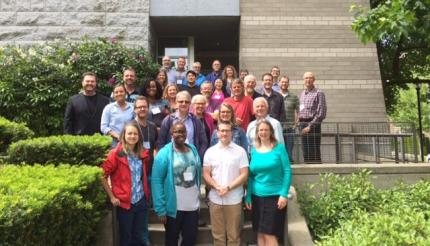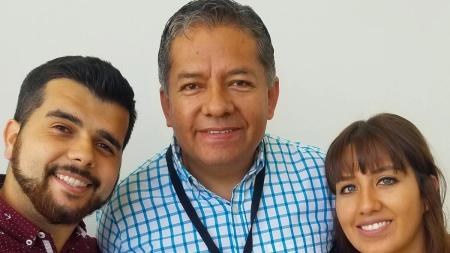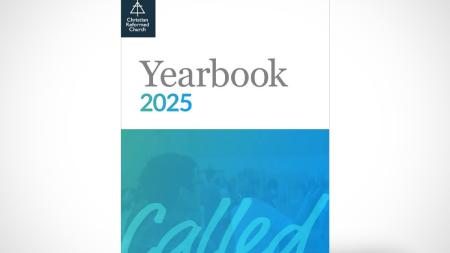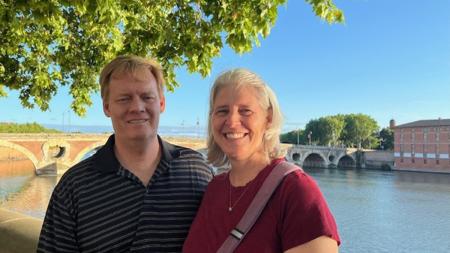Campus Pastors: Grappling with Major Spiritual Challenges on Today’s Campuses

Some of the campus pastors
Virginia Lettinga
More than ever, being a Christian Reformed Church campus pastor means doing ministry in an environment in which students are bombarded with ideas, options, competing worldviews, and potential belief systems.
Even students who arrive on campus from a solid church background tend to bring a range of questions, concerns, and challenges with them, said Paul Verhoef, campus pastor at the University of Calgary in Calgary, Alta.
Verhoef was among 40 participants from around North America who gathered in Vancouver, B.C., in late May for the annual Christian Reformed Church Campus Ministry conference, this year titled “What are the unique challenges to campus ministry?”
Speaking for many of the campus pastors attending the conference at Regent College, Verhoef said, “We live not in an age where religion isn’t welcome, but where all religious life is finally scrutinized more than ever before. Belief in God is disputable . . . [in public opinion, and] . . . secular humanism (or atheism) is [widely considered] a viable option today – and viable not only as a belief, but as a way of articulating a communal/human ethic.”
In the past, he said, “We used to live with a strong sense of transcendence . . . [but] faith is under pressure. And living out our faith with doubt is so common today on university campuses (and elsewhere of course). How can we as chaplains make space for doubts, support faith, welcome questions, and be hospitable to those to whom the doubts have turned towards unbelief?”
Using as background James K. A. Smith’s book How (Not) to be Secular, which helps to summarize philosopher Charles Taylor’s thought on the growing secularism in our world, campus pastors and others discussed the issues they face coming from students who are caught in this era of secularism and who, in some cases, are seeking a way out.
Hosted by three local CRC congregations, the conference included keynote speeches, panel discussions, seminars, worship services, and time for individual reflection.
As part of the event, representatives of the CRC’s Justice and Mercy ministries — taking part in the conference for the first time — presented sessions on the importance of taking time to get to know others who are different from you and how you need to create safe spaces in which this kind of learning can occur and relationships can develop.
“We spoke of the importance of creating safe places to have conversations — places in which young people can talk and be fully themselves,” said Bernadette Arthur of the CRC’s Race Relations office in Canada.
Campus pastors are dealing with issues that the broader church will eventually have to face, said Cindy Stover, a justice mobilizer with CRC Canadian Ministries. “On different campuses, the students are talking about global poverty, climate change, and connecting with Indigenous justice,” she said.
But there was one topic — and what are the best ways to deal with it — that the campus pastors kept mentioning throughout the conference.
Every CRC campus pastor is “trying to figure out how to get good at campus ministry in this day and age .... [and that means] addressing the needs of persons who are LGBT is front and center and very much in the life and work of campus ministry,” said Mark Wallace, director of the CRC’s 35 campus ministries.
Campus pastors always keep in mind that they are bringing the entirety of the gospel, its full message of loving your neighbor, to every aspect of the campuses they serve, said Wallace.
Verhoef said that making a place for persons who identify as LGBT is important, but it can present challenges: “How do we stand as pastors in the CRC with one foot in the CRC moral theology and also one foot on a university campus that has a dynamically different perspective?”
Brenda Kronemeijer-Heyink, pastor of Campus Edge Fellowship at Michigan State University in East Lansing, Mich., said she found it striking to learn that all of the campus pastor have had LGBT students participate in their ministries, “and that sometimes we feel like we don't know how best to welcome and minister to such students,” she said.
But she was helped by another pastor, who said, “It's important to encourage (and challenge) each student not to allow one's sexuality to get in the way of knowing and loving God.”
Many of the students who come to Michigan State, said Kronemeijer-Heyink, see faith as being about (rigidly) believing the right things (the fundamentals), and they are concerned about doubt. So in some ways, even though they are there, they consider the university a dangerous place.
“I have a lot of conversations about what to do when they do begin to question — even to the point where they're not sure what or if they believe. I see this as a movement forward, but it's hard to figure out how to describe as positive to churches such an apparent movement away from [certain] faith,” said Kronemeijer-Heyink.
In the end, said Verhoef, a core value of CRC campus ministry is to create communities in which students of many faiths or of none at all feel comfortable and have a sense of belonging.
In this kind of community, students can let down their guard, get know one another — and hopefully — find God, he said.


